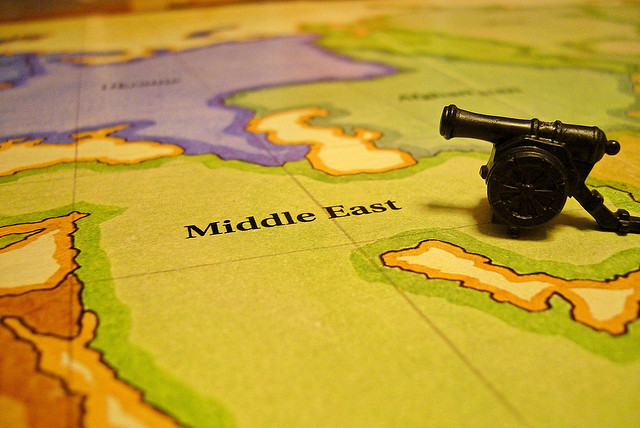
Can a New Administration Make U.S.-GCC Relations Great Again?
By Giorgio Cafiero, ASP Adjunct Fellow
With Barack Obama leaving the Oval Office, most Arab Gulf rulers welcome the departure of a U.S. president whose foreign policy left the Gulf Cooperation Council (GCC) feeling increasingly vulnerable to Iran’s ascendancy across the Middle East. The U.S. and Iran’s partial-thaw and Obama’s decision to avoid decisively fighting the Iranian-backed Syrian regime, according to most Arab Gulf officials, gave Tehran the upper-hand in the region’s volatile geopolitical landscape and exacerbated regional instability.
The Saudis and others in the GCC view Iran as their top geopolitical threat, seeing it as a revolutionary state committed to wreaking havoc across the Arab world. From their vantage-point, Saddam Hussein’s fall in 2003 paved the way for Tehran to establish an axis of Shi’ite-dominated powers stretching from Iran to the Eastern Mediterranean. This Iran-Iraq-Syria-Lebanon nexus has extended and consolidated Iranian and Shi’ite influence across the Levant, empowering the Iranians to establish networks of non-state actors which Saudi and other Arab Gulf officials see as ‘subversive’ and menacing to GCC security.
Donald Trump’s opposition to the Iranian nuclear deal, which he has repeatedly called the “worst deal ever negotiated”, and selection of anti-Iran hawks such as Michael Flynn and James “Mad Dog” Mattis for top cabinet positions have given some Arab Gulf rulers a sense of cautious optimism about the incoming administration’s foreign policy aligning more closely with Riyadh and other GCC capitals against Tehran.
The new Administration’s decisions on Syria will be important. For decades, the Alawite-led regime in Damascus has ruled a Sunni-majority country with a history of militant Sunni Islamist opposition to the secular Ba’athist order. Since 2011, many in the GCC have viewed Syria as the regional hotspot where Iran’s increasingly assertive hand has been most destabilizing, arguing that Islamic State (IS) is a symptom of Tehran’s ‘predatory’ influence in Iraq and Syria. By backing the armed opposition in Syria, the Saudis and Qataris have heavily invested in their efforts to establish a pro-GCC Sunni-led government in Damascus after overthrowing a pro-Iranian one.
As far as Syrian President Bashar al-Assad is concerned, however, the incoming Administration has signaled that dealing with his regime cannot be a top priority. Short of expressing outright support for Damascus, the President-elect has instead focused attention on enhancing Washington and Moscow’s cooperation in the fight against the so-called Islamic State. As a presidential candidate, Trump was highly incoherent and inconsistent on countless issues, yet on this point he was quite clear and consistent.
A key question in the Gulf is how could the new Administration devise a strategy in Syria that cooperates with Russia but weakens Iran? By partnering with Moscow in Syria, the U.S. would likely irk the Saudis and other Arab Gulf officials given Russia and Iran’s shared interests in the civil war and unprecedented levels of cooperation in their efforts to achieve common objectives. Trump cannot simultaneously help Russia (and by extension the Syrian regime) in a common struggle against radical Islam while also countering the same regime for the purpose of weakening the Islamic Republic and its network of “terrorist” groups such as Hezbollah, which have helped Assad sustain his rule throughout the past nearly six years of conflict. Given this contradiction on counter-terrorism in the Middle East, the Syrian crisis may become as big of a source of contention between the incoming administration and some GCC states as it has been with the outgoing one.
Syria is unlikely to be the only area causing Arab Gulf officials concern about Obama’s successor. Trump’s talk of an ‘America First’ foreign policy on the campaign trail and his arguments that the GCC states must pay Washington more for the U.S. military’s security shield in the Persian Gulf, which he has articulated in public forums since the 1980s, unsettle the Arab Gulf rulers. Trump has yet to convince the GCC states that he views them as key U.S. military allies in a struggle against radical Islam. Instead, there is concern that the real estate magnate views them as “cash cows” which have failed to contribute adequately to the Washington-led campaign against the Islamic State.
Moreover, Trump’s condemnation as a Presidential candidate of Arab Gulf sheikdoms’ contributions to the Clinton Foundation following last year’s massacre in Orlando suggested that he sees the GCC states as having too much influence in Washington. Additionally, Trump’s support for the Justice Against Sponsors of Terrorism Act (JASTA), which implies that the Saudi government bears responsibility for the 9-11 attacks and gives victims the right to sue the Kingdom in American courts, is another sensitive issue that his administration must address.
Nonetheless, how the new American Administration plans to challenge Tehran’s assertiveness in the region will be the center of the GCC’s focus this year. To restore the Arab Gulf states’ confidence in Washington, the U.S. should not immediately try to tear the Iranian nuclear deal to shreds. In fact, by now even the Saudis, who were previously skeptical of the accord, have voiced their support for maintaining the deal and view the accord as a safeguard against Iran’s ability to develop a nuclear weapon for 10-15 years. Without attempting to unravel the Iranian nuclear deal, the new Administration can improve Washington’s alliances with the GCC members by convincing them that the U.S. takes seriously their concerns about Iran and is committed to countering its activities in the region. Yet GCC officials are most concerned that by aligning Washington with the Kremlin in Syria while leaving the Assad regime alone, Trump’s strategy will further strengthen Iran’s hand in the Arab world at the expense of the council members’ collective security.





